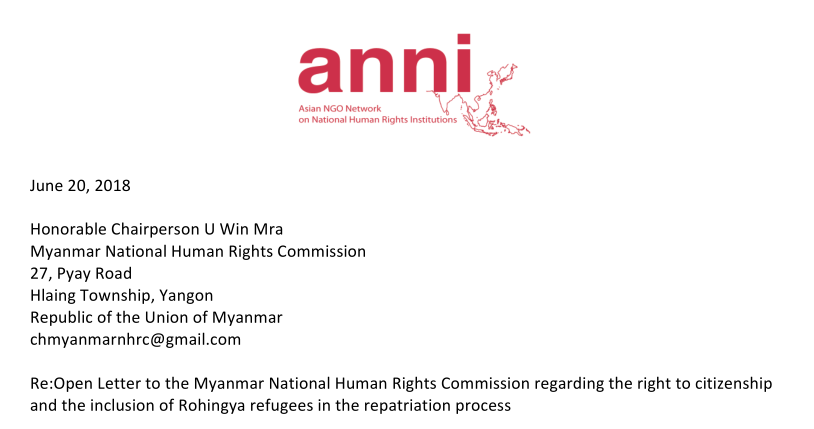June 20, 2018
Honorable Chairperson U Win Mra
Myanmar National Human Rights Commission
27, Pyay Road
Hlaing Township, Yangon
Republic of the Union of Myanmar
[email protected]
Open Letter to the Myanmar National Human Rights Commission regarding the right to citizenship and the inclusion of Rohingya refugees in the repatriation process
Dear Honorable U Win Mra,
Today, on the occasion of the World Refugee Day, the Asian NGO Network on National Human Rights Institutions (ANNI), whose Secretariat is at the Asian Forum for Human Rights and Development (FORUM-ASIA), would like to request the Myanmar National Human Rights Commission (MNHRC) to protect and promote the rights of Rohingya communities including those who have been displaced due to persecution and violences.
FORUM-ASIA and its civil society members in Bangladesh organised a fact-finding mission from 24-29 March 2018 to collect first-hand information about the human rights and humanitarian situation in Rohingya refugee camps in Cox’s Bazar of Bangladesh. The mission visited seven locations of the camps and interacted with over 80 Rohingya men and women.
The key finding from the mission[1] is that the Rohingya refugees would like to return back to their home country Myanmar as soon as possible. However, they have a few fundamental concerns to be addressed before the repatriation process begins: (a) Rohingyas must be assured of Myanmar citizenship with Rohingya identity; (b) there should be a guarantee of unrestrained freedoms, including education and livelihood opportunities, as enjoyed by any other Myanmar citizen; (c) and a repatriation plan designed in close consultation with the Rohingya refugees.
The right to return to his/her country and to a nationalityare fundamental human rights guaranteed in Article 13 and 15 of the Universal Declaration of Human Rights, without distinction of any kind including races, religions, and other status To ensure that every human being including the self-identified Rohingya ethnic group, is able to realise this right is well within the mandate of the MNHRC established pursuant to the 2014 Myanmar National Human Rights Commission Law, which aims to ‘create a society where human rights are respected and protected in recognition of the Universal Declaration of Human Rights.’In this context, we would like to request the MNHRC to recommend that Parliament amends the 1982 Citizenship Law of Myanmar so that it is in line with the Universal Declaration of Human Rights. The current Citizenship Law, as the MNHRC is aware, is discriminatory against Rohingyas as it doesn’t recognise Rohingyas as part of Myanmar’s national races..
ANNI is also aware of the Memorandum of Understanding (MoU) on the Rohingya repatriation signed between the Government of Myanmar and the United Nations Development Programme (UNDP) and the United Nations High Commissioner for Refugees (UNHCR) on 6 June 2018. Unfortunately, though details of the MoU have not been made public, media commentaries suggest thatit has not involved the participation of the Rohingya refugees. The lack of refugees’ participation in the MOU contradicts international human rights laws, principles, and practices to ensure that the repatriation process is informed, voluntary, secure, and sustainable. The Rohingya refugees have made it very clear that any repatriation plan designed without their participation will not at all be acceptable to them. In this respect, we would like to ask the MNHRC to immediately write to the Government of Myanmar, UNDP, and UNHCR to publicise the MoU and ensure that the concerned population, the Rohingya refugees in this case, are properly consulted.
Granting MNHRC a ‘B’ status, the Global Alliance on National Human Rights Institutions (GANHRI[2])’s Sub-committee on Accreditation (SCA) had in November 2015 asked MNHRC to ‘interpret its mandate in a broad, liberal, and purposive manner, and to promote and protect human rights of all including the rights of Rohingya and other minority groups.’ On this World Refugee Day, we would like to urge the MNHRC to take the SCA’s advice seriously and act as best as it can within its mandate.
ANNI would like to reiterate that the MNHRC has a significant role to play to protect and promote the rights of the Rohingyas. We sincerely hope that MNHRC will rise up to the occasion and will stand with all peoples of Myanmar.
Sincerely yours,
John Samuel
Executive Director
Asian Forum for Human Rights and Development (FORUM‐ASIA)
The Secretariat of the Asian NGO Network on National Human Rights Institutions (ANNI
About the Asian NGO Network on National Human Rights Institutions (ANNI)
The Asian NGOs Network on National Human Rights Institutions (ANNI) was established in December 2006. It is a network of Asian non‐governmental organisations and human rights defenders working on issues related to National Human Rights Institutions (NHRIs). ANNI has members that are national organisations from all over Asia. ANNI currently has 33 member organisations from 21 countries or territories. The work of ANNI members focuses on strengthening the work and functioning of Asian NHRIs to better promote and protect human rights as well as to advocate for the improved compliance of Asian NHRIs with international standards, including the Paris Principles and General Observations of the SubCommittee on Accreditation (SCA) of the Global Alliance of NHRIs (GANHRI)
[1]The mission report is available in this link: (Put the link once the report is published on Monday)
[2] GANHRI used to be previously called ‘International Coordinating Committee (ICC) of National Institutions’ until 2015.
***
For a pdf version of the letter, click here.




